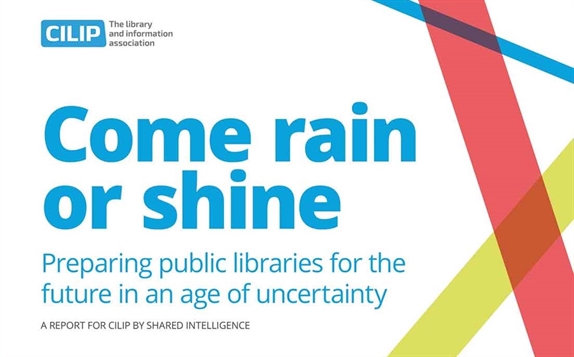
Ben Lee.
Future Libraries is a project that was launched by CILIP earlier this year, in conjunction with Shared Intelligence. The aim was to help public -library services to look to the future and plan ahead – not always an easy task. The result
is a step-by-step guide and resource pack that helps library service managers to better understand the risk and opportunity – here Shared Intelligence’s Ben Lee discusses the project ahead of a workshop at this year’s CILIP Conference.
Book now at www.cilipconference.org.uk.
MAKING the best decisions requires the best evidence – but when the decisions are based on unknown future possibilities it can feel more like guesswork. However there are steps that you can take to make rational decisions, even when the
world seem unpredictable, and thanks to CILIP’s Future Libraries work there is a simple guide to help navigate your way through uncertainties.
Come Rain or Shine has been developed by Shared Intelligence to encourage managers and decision-makers to consider the medium to long-term picture, and look at how they can plan ahead. It has been created to be adaptable and help those
using it develop insights that are unique to their services.
Ben Lee, Co-Director of Shared Intelligence, explains that his own professional background began in central government, but he has “had a varied career, getting involved in community empowerment, arts and culture, impact evaluation, and
futures literacy”. Shared Intelligence is a public policy research consultancy that works mainly on public services, making it a good fit to deliver the Future Libraries work for CILIP.
Ben says: “Future Libraries is a project in two-parts. The first part is a scenarios-based research report, Come Rain or Shine, which argues that over the coming decades libraries will need to provide digital and social connections, a
‘People’s Network 2.0’ and to build their leadership capacity.
“The second part, which I am even more excited about, is a toolkit which we hope will enable public library services to build their own futures literacy.”
Futures literacy is a term that not everyone will be familiar with, but is something we all have a grasp of to some degree. Put simply, it means understanding what we mean by “the future”. Ben says: “We sometimes think of it as a different
place like another city or country, but in fact it is a completely different concept because it never exists. We all understand this at some level, although we may not always realise, and it allows us to prepare for uncertainty on
a daily basis – for instance putting sunglasses on but also carrying an umbrella when the weather is unpredictable. When thinking about providing services many years into the future, however, things can become a bit more complicated.
The resources from the Future Libraries project provide a platform to think about the future in a more concerted way.”
Ben adds: “I believe futures literacy is an essential skill for everyone: understanding trends, using scenarios to prepare for uncertainties, thinking about the future as multiple possibilities.”

And playing on the notion that we can all make an informed decision about whether to take just an umbrella or sunglasses too, those resources echo the notion of weather. Ben explains: “We created four scenarios which we explain as different
types of weather over the coming decade; blue skies, storms, sunshine and showers, and another grey day. The scenarios were created by combining different strategic uncertainties (e.g. ‘will the economy get better or worse?’ and ‘will
local government have more or less freedom?’) and getting library professionals to imagine the different kinds of futures that would result, depending on which way those uncertainties play out.”
Having imagined those alternatives, it is easier to start planning and allows librarians to consider what, and how, services may perform in an uncertain decade. Ben says: “Sometimes we see futures reports which contain really important conclusions,
but they don’t influence the actions of the audiences they are aimed at. We believe this is because you have to build up futures literacy in order to know what to do with a futures report. ‘The future’ is a really strange and difficult
concept, and our toolkit is all about helping people think and talk about the future in order to take better decisions today.
“Say a library service wants to do more to support local community groups and one option is to encourage local groups to bring their existing activities and events into library spaces. The library service could use the toolkit to test this
idea against different scenarios, i.e. different equally plausible versions of 2040. It will help them see how their community groups idea works in different scenarios.
“This might help them see that it makes most difference when the socioeconomic environment is really tough, but that is also when it will be hardest to keep supporting groups in this way, and that it is easiest to fund when the external environment
is less tough, but that might be when the case for it is less compelling.”
The toolkit has already been tested by library services, and feedback from that early testing helped shape the final resources. And one of the clear benefits has been for services to understand their own role in the future – yes there are
many unknowns, but the toolkit has enabled people to see how they can be influence on those futures.
Ben says: “The most common reaction we get from those who have used the toolkit is that it helps them see familiar problems differently. It also helps them differentiate between uncertainties they cannot change in the short term – like the
state of the economy or extreme weather – from those where they can make a difference – like information literacy in their local community.”
So while it may appear that we are heading towards an unknown future, it is also apparent that the future is not static and can be shaped. And that is where the real power of the Future Libraries work comes in - it empowers services to be
agents of change, not just reacting to problems as they arise. Instead they can begin to head-off problems before they happen; look to take advantage of opportunities as they approach – not after the event; and position library services
in a space where they are prepared and proactive.
The toolkit and report have already been downloaded hundreds of times since it was launched earlier in spring. And many people will have already begun looking at how they can prepare for the future using it. With Ben’s appearance at this year’s
CILIP Conference, there will be an opportunity to engage directly and find out more about how to best use the resources.
“You will get a rapid introduction to the concept of futures literacy and the role of scenarios in futures studies,” says Ben. “We will also take you through a practical exercise to develop a set of scenarios yourself and explore how these
can be used for improving your library service and making it more resilient to uncertainty.”
He adds: “We cannot predict the future but we can prepare for uncertainty, and sometimes if we work together, we can influence the future for the better.”
You can book your place at CILIP Conference now.






